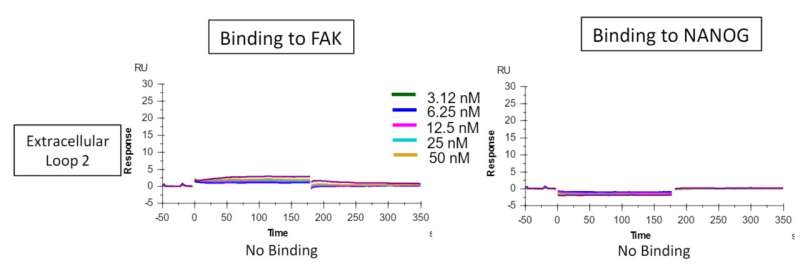This article has been reviewed according to Science X's editorial process and policies. Editors have highlighted the following attributes while ensuring the content's credibility:
fact-checked
peer-reviewed publication
trusted source
proofread
Research highlights unprecedented targeted approach to treating triple-negative breast cancer

Cleveland Clinic researchers have successfully developed a therapeutic peptide that blocks aggressive cancer cells from multiplying rapidly. The results highlight a potential new strategy for developing targeted treatments for triple-negative breast cancer, which currently has no approved options.
Targeted drugs attack cancer cell functions directly, offering a more precise approach to complement broader treatments like chemotherapy. A research team led by Ofer Reizes, Ph.D., and Justin Lathia, Ph.D., designed a peptide therapeutic that disrupts the molecular processes behind aggressive cancer growth when delivered into cells.
The drug stopped cancer growth and induced tumor cell death and only affected cancerous cells in preclinical work. The study was highlighted in Molecular Cancer Therapeutics.
"It's devastating that we currently have such limited options to help people with triple-negative breast cancer," says Dr. Reizes, the Laura J. Fogarty Endowed Chair for Uterine Cancer Research. "We want our results to offer hope for these patients and their families and serve as a starting point to get more treatments into the development pipeline."
Peptides are short proteins made up of amino acids that are the "building blocks" of larger proteins. Natural and artificially synthesized proteins are commonly used to treat disease. Some peptides are used to supplement existing proteins in the body, like insulin in people with diabetes.
The peptide in development, based on a 2018 Cleveland Clinic discovery, serves as a proof-of-concept for this type of drug for triple-negative breast cancer.
Because triple-negative breast cancer cells lack certain receptors, drugs designed to treat other subtypes of breast cancer won't work. There are currently no targeted drugs approved for triple-negative breast cancer, which makes up 15% of breast cancer cases. To develop new drugs, investigators needed to identify new, effective targets.
A previous joint postdoctoral fellow with Dr. Reizes and Dr. Lathia's team found Cx26, a type of protein called a connexin, forms a molecular complex in triple-negative breast cancer cells that makes them more likely to recur or spread through the body. Investigators worked to find a way to disrupt that complex, which would limit the cancerous properties of the cells.
First authors Erin Mulkearns-Hubert, Ph.D., and Emily Esakov Rhoades, Ph.D., developed a peptide therapeutic. The peptide's sequence is the same as the component of Cx26 necessary for the complex to form. The goal is to saturate the system with the peptide and interrupt the ability of the full-length proteins to bind, says Dr. Mulkearns-Hubert, a research associate in the Lathia lab.
"The peptide's design was actually relatively straightforward and worked beautifully, slowing tumor growth in preclinical models," she says. "Triple-negative breast cancer remains an incredibly difficult tumor type to treat, so developing and verifying strategies like this peptide's design is critical to moving forward."
Researchers observed that the drug prevented cancer stem cells in a dish from self-renewing, a characteristic of aggressive cancer cells that supports treatment resistance. The team is now working with Cleveland Clinic Innovations to develop the drug and explore potential for clinical trials.
More information: Erin E. Mulkearns-Hubert et al, Targeting NANOG and FAK via Cx26-derived Cell-penetrating Peptides in Triple-negative Breast Cancer, Molecular Cancer Therapeutics (2023). DOI: 10.1158/1535-7163.MCT-21-0783


















